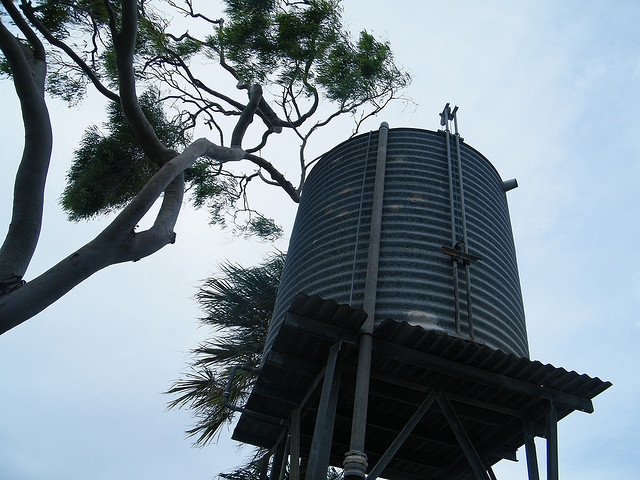


LARGE green PVC water tanks of 1000 litres all the way up to 5000 litres and counting, perched high on overhead reserve stands at various households, particularly those in the middle and low density suburbs of Harare, are not a sign of wealth in a city. They are, in fact, a crystal clear sign of failed water delivery and management by city fathers. Corruption, lack of diligence, insensitivity to the needs of the majority, selfishness, greed — a whole potpourri of mismanagement — has muddied up the Harare water management in much the same way that chemical pollutants, toxins and pathogens have contaminated the precious liquid itself. This has rendered both the liquid and its management thereof unpalatable for the citizens, unless precautions and other forms of detoxification are employed.
The management of water in the city of Harare and the surrounding satellite towns that depend on it — Chitungwiza, Ruwa, Epworth and Norton has over the years left a lot to be desired. As the population of the city has grown due to the rural urban migration over the years, there has been need to increase water sources particularly through the rehabilitation of Harare’s main water plants — Morton Jaffray as well as the Prince Edward, Firle, Crowborough and the redundant Odis plant — as well as supplementing supply with additional sources like the Kunzvi Dam project and later on the Musami Dam project.
However, because of a number of reasons plans to see these visions to fruition have eluded the city. Years since it was established Harare’s water plants need major rehabilitation work, nothing significant has been done to improve the situation. In fact the water reticulation systems have worsened over the years. Responsibility of seeing these plans through have been shifted from city (local government) to ministry of lands — which over the years has mutated under different names. The two ministries of Water and Local Government, among other players, have stakes in the development.
Kunzvi Dam plans were first mooted over 30 years ago and only got Cabinet approval in 1996, yet they continue to be work in never-ending progress. Recently the plans for Kunzvi Dam project also passed through different hands when the nation went through an inclusive government with three different parties in the coalition. Lack of funds has often been cited as the major hold back in significantly improving the water situation including setting up of additional sources.
However, over the past 10 years several countries — among them China and Germany, Korea — have come to the table with some financial assistance in the form of grants, loans and other arrangements towards either the rehabilitation of the city’s plants or the building of Kunzvi Dam for additional water. The water situation has remained dire despite the fact that assistance in millions of monies as well as in kind has been rendered towards the improvement of the reticulation system over the years.
Financial assistance since 2009 has included but not limited to US$10 million grant from government; an ADB loan; as well as US$144 million loan by EximBank of China last year. What has been an obvious challenge is management of these amounts. One of the reasons being that there has not been a stand alone water account. Funds for water have been deposited into the global city account thereby posing a challenge in managing it as a separate entity.
A few years back, Harare Water and Sanitation director, Christopher Zvobgo, told a Parliamentary portfolio committee that, “Harare Water is hardly able to make any meaningful plans of investing in the infrastructure, let alone repair the same, without first seeking authority from the city treasurer.” While Harare alone needs 1000 megalitres of water per day, current available treated water stands at 400 megalitres. Earlier in the year (and before) treated water supply for the city stood at 500 mega litres, but this reduced to 400 mega litres in April due to failure to afford water treatment chemicals.
Although city health director, Prosper Chonzi, recently told the Financial Gazette that the city was religiously treating water with eight different chemicals at a cost of US$3 million a month, some sources say challenges in procurement of water treatment chemicals have continued to dog the city. During the inclusive government, UNICEF and partners assisted with the provision of chemicals before handing over the task back to the city council a few years ago.
Although the local authorities have bemoaned the cancellation of household debts of water arrears to the general populace amounting to US$330 million following a government directive to fulfil a populistic promise the ruling party had made to the masses on the eve of the 2013 harmonised elections, given the loans and other monies from the fiscus and others, these municipalities should not be suffering financially.
But no matter how much in loans (and indeed in grants) the city of Harare acquires, that is not reflecting in any improvement in the water situation. “I am aware of people in Borrowdale who have not had water for years. I am also aware of people in Mabvuku and Tafara who had not had water for years,” Harare Mayor, Bernard Manyenyeni told the Financial Gazette. Yet, some of the latest monies, which had been earmarked for work on the water and reticulation system, in particular the US$144 million has been used to buy vehicles for management.
A probe has been commissioned by the mayor to establish how many vehicles exactly were purchased. According to details emerging from an audit of the Chinese loan facility 56 vehicles and tractors were bought. Manyenyeni told the Financial Gazette that the timing of the buying of the vehicles could not have been worse. “At or about the same time vehicles were being bought, our water supply reduced by 20 percent from 500 megalitres a day to 400 megalitres a day due to water shortages,” Manyenyeni said.
There has been an outcry from various sections of society with residents and residents associations, among others calling for the removal of town clerk, Tendai Mahachi, and even of the Minister of Local Government, Public Works and National Housing, Ignatius Chombo, who is seen as shielding Mahachi from any attempts to oust him. A few months ago, Manyenyeni suspended Mahachi over an issue concerning council finances where the town clerk was failing to produce salary structures; the suspension was quickly reversed by Chombo, who ordered that Mahachi return to work.
Manyenyeni, who had been irked by Mahachi’s lack of cooperation in efforts to get to the bottom of the council’s finances and operations, had to back down, leaving Mahachi to continue on as before. Asked why he backed down on the matter when residents were rooting for him to get to the bottom of mismanagement of the city and clean up and get service delivery including water working, Manyenyeni could only say to the Financial Gazette last Thursday that, “I was under pressure.”
Meanwhile, Manyenyeni has ordered two probes at the council — the first a generalised one looking at all financial operations; and another a more specific one to investigate in particular the US$144 million loan from China. While all this goes on, residents will continue to grapple with water challenges well into unforeseeable future.
newsdesk@fingaz.co.zw